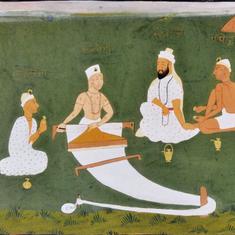The impending entry of Bharatiya Janata Party chief Amit Shah, the exit of several heavyweight opposition leaders and the defection of the Janata Dal (United) to the ruling National Democratic Alliance, is set to significantly change how the Rajya Sabha functions. Added to that is uncertainty in the Congress party about the return of its senior leader Ahmed Patel to the upper House of Parliament.
Although the BJP-led NDA won a large majority in Lok Sabha in the 2014 election, it was outnumbered by the opposition in the Upper House. In the three years since, the gap has narrowed considerably. The opposition still has the edge but it will now be possible for the government to push through its agenda with deft floor management.
Currently, the NDA has 85 seat in the 245-member House, while the Congress-led United Progressive Alliance has 63. But the latter’s ranks are buttressed by the Samajwadi Party, Bahujan Samaj Party, Trinamool Congress and communist parties, which together have 44 members.
It was not merely numerical superiority that made opposition parties so dominant in the Rajya Sabha. It was also that they boasted several heavyweight figures who could take the fight to the government. Of those, BSP chief Mayawati has resigned, while the JD(U)’s Sharad Yadav will no longer be batting for the opposition. The articulate CPI(M) General Secretary Sitaram Yechury is retiring.
“The front benches of the opposition are now bereft of senior leaders whose speeches made an impact and were important for political messaging,” an opposition MP in the Rajya Sabha explained. He pointed out, as an example, that Satish Mishra, who now leads the BSP in the House, will not have the same impact as Mayawati. The same can be said of whoever replaces Yechury.
The Congress has several articulate speakers in the Rajya Sabha, such as former ministers P Chidambaram, Kapil Sibal and Jairam Ramesh, but they rarely get to speak because of the party’s internal politics. Leader of the Opposition Ghulam Nabi Azad and his deputy Anand Sharma invariably field themselves as lead speakers in most debates, no matter what the subject. It would, for instance, have been sense to allow Chidambaram, a former finance minister, to open the debate on the Goods and Services Tax Bill. Instead, he was brought in half-way through the debate.
While the opposition is chafing at the loss of senior leaders, the treasury benches are set to acquire more bite. The BJP’s electoral victories, especially in Uttar Pradesh, have already emboldened its members. The addition of the nine-member JD(U) to its ranks and Amit Shah’s presence is expected to cause greater confrontation between the two sides. Not only will the BJP members participate in the proceedings more regularly, they will likely also be more aggressive as they vie with each other to impress the boss.
To top it all, BJP’s M Venkaiah Naidu, if he is elected Vice President of India next month is widely expected, will become chairperson of the Rajya Sabha.
Shifting power centre
When it was reported that Shah, currently an MLA in Gujarat, was entering the Rajya Sabha, it triggered speculation that he would be joining the governent in the next Cabinet reshuffle. It was also said he would take charge of the home ministry – a portfolio he had handled in Gujarat – thereby further sidelining Rajnath Singh.
BJP leaders, however, insisted that Shah will not accept a ministerial berth as he enjoys far greater powers as party president and is “totally focused” on planning for the 2019 Lok Sabha election. A senior BJP minister explained that Shah decided to shift to the Rajya Sabha because it was not appropriate that the party president should contest an assembly seat. “It was only logical that he should be accommodated in the Parliament,” the minister said. At the same time, his presence in the Upper House will be a source of comfort for Prime Minister Narendra Modi given their proximity to each other, the minister added.
BJP leaders were unwilling to predict if the BJP chief would actively participate in the proceedings given that he has his hands full with party work, not least the upcoming Assembly elections in Gujarat, Himachal Pradesh and Karnataka. Nevertheless, Shah’s contributions, in the form of speeches or interventions, will be keenly followed by members of his party as well as the opposition.
Shah’s articulation of the party’s pet issues will provide a direction to BJP members but it could also lead to further skirmishes with the opposition. Since the BJP president is not known to be a diplomatic speaker and loves a good fight, the thinking goes, he will not hesitate to take on the opposition. Defence minister Arun Jaitley, who doubles as leader of the Rajya Sabha, has a good equation with opposition leaders, and that helps him resolve many tricky issues. But the same cannot be said about Shah.
It remains to be seen whether Shah’s presence in the Rajya Sabha will affect the intra-party dynamics in the BJP. Will he, say, overshadow Jaitley, an old hand in the Parliament or will he be a hands off member. Will it be business as will Shah bring his signature combative style to the Upper House?










